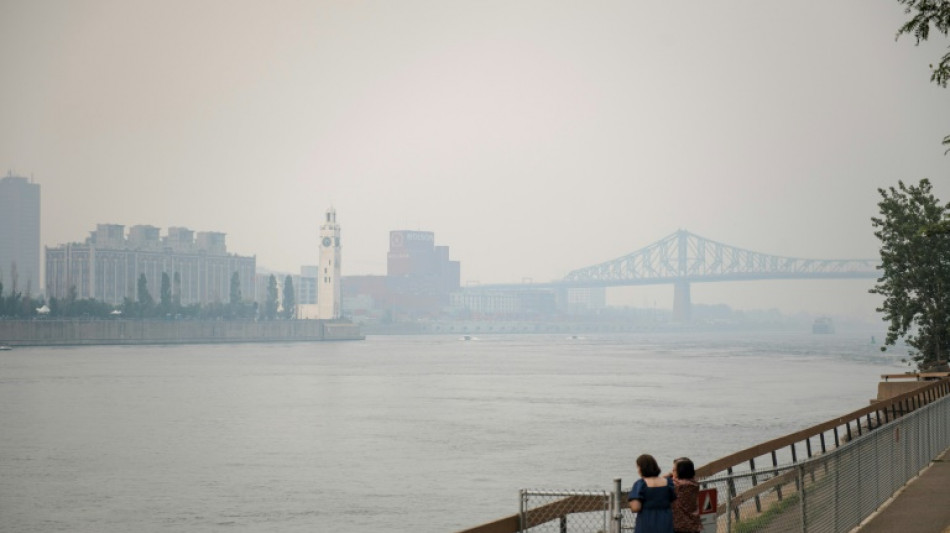
-
 Argentina govt launches account to debunk 'lies' about Milei
Argentina govt launches account to debunk 'lies' about Milei
-
Australia drug kingpin walks free after police informant scandal

-
 Dupont wants more after France sparkle and then wobble against Ireland
Dupont wants more after France sparkle and then wobble against Ireland
-
Cuba says willing to talk to US, 'without pressure'

-
 NFL names 49ers to face Rams in Aussie regular-season debut
NFL names 49ers to face Rams in Aussie regular-season debut
-
Bielle-Biarrey sparkles as rampant France beat Ireland in Six Nations

-
 Flame arrives in Milan for Winter Olympics ceremony
Flame arrives in Milan for Winter Olympics ceremony
-
Olympic big air champion Su survives scare

-
 89 kidnapped Nigerian Christians released
89 kidnapped Nigerian Christians released
-
Cuba willing to talk to US, 'without pressure'

-
 Famine spreading in Sudan's Darfur, UN-backed experts warn
Famine spreading in Sudan's Darfur, UN-backed experts warn
-
2026 Winter Olympics flame arrives in Milan

-
 Congo-Brazzaville's veteran president declares re-election run
Congo-Brazzaville's veteran president declares re-election run
-
Olympic snowboard star Chloe Kim proud to represent 'diverse' USA

-
 Iran filmmaker Panahi fears Iranians' interests will be 'sacrificed' in US talks
Iran filmmaker Panahi fears Iranians' interests will be 'sacrificed' in US talks
-
Leicester at risk of relegation after six-point deduction

-
 Deadly storm sparks floods in Spain, raises calls to postpone Portugal vote
Deadly storm sparks floods in Spain, raises calls to postpone Portugal vote
-
Trump urges new nuclear treaty after Russia agreement ends

-
 'Burned in their houses': Nigerians recount horror of massacre
'Burned in their houses': Nigerians recount horror of massacre
-
Carney scraps Canada EV sales mandate, affirms auto sector's future is electric

-
 Emotional reunions, dashed hopes as Ukraine soldiers released
Emotional reunions, dashed hopes as Ukraine soldiers released
-
Bad Bunny promises to bring Puerto Rican culture to Super Bowl

-
 Venezuela amnesty bill excludes gross rights abuses under Chavez, Maduro
Venezuela amnesty bill excludes gross rights abuses under Chavez, Maduro
-
Lower pollution during Covid boosted methane: study

-
 Doping chiefs vow to look into Olympic ski jumping 'penis injection' claims
Doping chiefs vow to look into Olympic ski jumping 'penis injection' claims
-
England's Feyi-Waboso in injury scare ahead of Six Nations opener

-
 EU defends Spain after Telegram founder criticism
EU defends Spain after Telegram founder criticism
-
Novo Nordisk vows legal action to protect Wegovy pill

-
 Swiss rivalry is fun -- until Games start, says Odermatt
Swiss rivalry is fun -- until Games start, says Odermatt
-
Canadian snowboarder McMorris eyes slopestyle after crash at Olympics

-
 Deadly storm sparks floods in Spain, disrupts Portugal vote
Deadly storm sparks floods in Spain, disrupts Portugal vote
-
Ukrainian flag bearer proud to show his country is still standing

-
 Carney scraps Canada EV sales mandate
Carney scraps Canada EV sales mandate
-
Morocco says evacuated 140,000 people due to severe weather

-
 Spurs boss Frank says Romero outburst 'dealt with internally'
Spurs boss Frank says Romero outburst 'dealt with internally'
-
Giannis suitors make deals as NBA trade deadline nears

-
 Carrick stresses significance of Munich air disaster to Man Utd history
Carrick stresses significance of Munich air disaster to Man Utd history
-
Record January window for transfers despite drop in spending

-
 'Burned inside their houses': Nigerians recount horror of massacre
'Burned inside their houses': Nigerians recount horror of massacre
-
Iran, US prepare for Oman talks after deadly protest crackdown

-
 Winter Olympics opening ceremony nears as virus disrupts ice hockey
Winter Olympics opening ceremony nears as virus disrupts ice hockey
-
Mining giant Rio Tinto abandons Glencore merger bid

-
 Davos forum opens probe into CEO Brende's Epstein links
Davos forum opens probe into CEO Brende's Epstein links
-
ECB warns of stronger euro impact, holds rates

-
 Famine spreading in Sudan's Darfur, warn UN-backed experts
Famine spreading in Sudan's Darfur, warn UN-backed experts
-
Lights back on in eastern Cuba after widespread blackout

-
 Russia, US agree to resume military contacts at Ukraine talks
Russia, US agree to resume military contacts at Ukraine talks
-
Greece aims to cut queues at ancient sites with new portal

-
 No time frame to get Palmer in 'perfect' shape - Rosenior
No time frame to get Palmer in 'perfect' shape - Rosenior
-
Stocks fall as tech valuation fears stoke volatility


Canada wildfire smoke chokes millions in North America
A deep orange-brown sun shined through hazy skies as smoke from Canadian wildfires spread across North America and beyond, choking millions of people and triggering severe air quality alerts.
Here's why the fires are so smoky and why people should be concerned.
- Why is there so much smoke? -
The number of fires and the amount of land scorched, as well as the amount of smoke emitted from the blazes, are unprecedented this wildfire season, and it is just the beginning, according to officials.
The fact that fires flared at the same time across the country is also unusual.
As of Wednesday, more than eight million hectares (20 million acres) of forests and grasslands had burned across Canada, breaking an annual record of 7.3 million hectares set in 1989.
And Canada has yet to reach the peak of the fire season, which is usually in July or August.
"We have a fire in northern Quebec which currently covers 700,000 hectares, for example. It's hard to fathom just how big it is," said Yan Boulanger, a fire specialist for the Canadian Ministry of Natural Resources.
A hot, dry spring resulted in a large fuel load -- dried vegetation and dead branches -- in Canada's boreal forest.
Smoldering humus fires that can burn deep underground produce a lot of smoke, resulting in higher carbon monoxide emissions, says Jack Chen of Canada's environment ministry.
The climate consequences are devastating as the boreal forest releases 10 to 20 times more carbon per unit of area burned than other ecosystems.
Hundreds of forest fires since early May have generated nearly 600 million tons of carbon dioxide, equivalent to 88 percent of the country's total greenhouse gas emissions from all sources in 2021, the Copernicus Atmosphere Monitoring Service (CAMS) reported.
- What are the health concerns? -
Wildfire smoke is more toxic than other types of smoke and can be more dangerous to human health than other sources of air pollution, for example.
The particles are fine and can travel deep into the respiratory tract.
Composed of ozone, sulphur dioxide, nitrogen dioxide, carbon monoxide, volatile organic compounds and PM2.5 fine particles, smoke from forest fires is a danger to all, according to experts and officials.
But it can be particularly dangerous for young children, pregnant women, smokers, seniors and those who suffer from chronic health problems, the Canadian government has warned.
"The particles are so small, particularly the ultra-fine ones, that they can get all the way down into your lungs and then cross over into your bloodstream and lead to inflammation," said Courtney Howard, an emergency room doctor in Yellowknife in Canada's Northwest Territories.
It also can have direct consequences on mental health, mood and anxiety, doctors say.
- What are the effects on wildlife? -
Wildfire smoke particles contain a higher proportion of carbon-based pollutants in various chemical forms that may be spread hundreds of kilometers (miles) from the fires themselves.
This smoke can lead to "acute or chronic health effects on wildlife," just like in humans, said Matthew Mitchell of the University of British Columbia in Vancouver.
"There's a whole suite of chemicals in the smoke that can affect gas exchange in the blood, lower the lung capacity of animals," he told AFP.
Weakened animals will tend to "rest more or try to reduce their activity. So they're not going out and feeding, looking for food or mates," he said.
"Even marine mammals such as whales and dolphins can be affected by the smoke when they come up to breathe," he said.
G.AbuHamad--SF-PST




